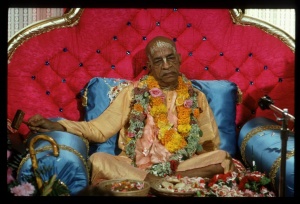CC Madhya 24.100 (1975): Difference between revisions
(Vanibot #0027: CCMirror - Mirror CC's 1996 edition to form a basis for 1975) |
(Vanibot #0020: VersionCompareLinker - added a link to the Version Compare feature) |
||
| Line 2: | Line 2: | ||
<div style="float:left">'''[[Sri Caitanya-caritamrta (1975)|Śrī Caitanya-caritāmṛta (1975)]] - [[CC Madhya (1975)|Madhya-līlā]] - [[CC Madhya 24 (1975)|Chapter 24: The Sixty-One Explanations of the Atmārāma Verse]]'''</div> | <div style="float:left">'''[[Sri Caitanya-caritamrta (1975)|Śrī Caitanya-caritāmṛta (1975)]] - [[CC Madhya (1975)|Madhya-līlā]] - [[CC Madhya 24 (1975)|Chapter 24: The Sixty-One Explanations of the Atmārāma Verse]]'''</div> | ||
<div style="float:right">[[File:Go-previous.png|link=CC Madhya 24.99 (1975)|Madhya-līlā 24.99]] '''[[CC Madhya 24.99 (1975)|Madhya-līlā 24.99]] - [[CC Madhya 24.101 (1975)|Madhya-līlā 24.101]]''' [[File:Go-next.png|link=CC Madhya 24.101 (1975)|Madhya-līlā 24.101]]</div> | <div style="float:right">[[File:Go-previous.png|link=CC Madhya 24.99 (1975)|Madhya-līlā 24.99]] '''[[CC Madhya 24.99 (1975)|Madhya-līlā 24.99]] - [[CC Madhya 24.101 (1975)|Madhya-līlā 24.101]]''' [[File:Go-next.png|link=CC Madhya 24.101 (1975)|Madhya-līlā 24.101]]</div> | ||
{{CompareVersions|CC|Madhya 24.100|CC 1975|CC 1996}} | |||
{{RandomImage}} | {{RandomImage}} | ||
==== TEXT 100 ==== | ==== TEXT 100 ==== | ||
<div class="verse"> | <div class="verse"> | ||
:dharmaḥ projjhita-kaitavo | :dharmaḥ projjhita-kaitavo 'tra paramo nirmatsarāṇāṁ satāṁ | ||
:vedyaṁ vāstavam atra vastu | :vedyaṁ vāstavam atra vastu śivadaṁ tāpa-trayonmūlanam | ||
:śrīmad-bhāgavate | :śrīmad-bhāgavate mahāmuni-kṛte kiṁ vā parair īśvaraḥ | ||
:sadyo hṛdy avarudhyate | :sadyo hṛdy avarudhyate 'tra kṛtibhiḥ śuśrūṣubhis tat-kṣaṇāt | ||
</div> | </div> | ||
| Line 20: | Line 19: | ||
<div class="synonyms"> | <div class="synonyms"> | ||
dharmaḥ—religiosity; projjhita—completely rejected; kaitavaḥ—in which fruitive intention; atra—herein; paramaḥ—the highest; nirmatsarāṇām—of the fully pure in heart; satām—devotees; vedyam—to be understood; vāstavam—factual; atra—herein; vastu—substance; śiva-dam—giving well-being; tāpa-traya—of | dharmaḥ—religiosity; projjhita—completely rejected; kaitavaḥ—in which fruitive intention; atra—herein; paramaḥ—the highest; nirmatsarāṇām—of the fully pure in heart; satām—devotees; vedyam—to be understood; vāstavam—factual; atra—herein; vastu—substance; śiva-dam—giving well-being; tāpa-traya—of threefold miseries; unmūlanam—causing uprooting; śrīmat—beautiful; bhāgavate—in the Bhāgavata Purāṇa; mahā-muni—by the great sage (Vyāsadeva); kṛte—compiled; kim—what; vā—indeed; paraiḥ—with others; īśvaraḥ—the Supreme Lord; sadyaḥ—at once; hṛdi—within the heart; avarudhyate—becomes confined; atra—herein; kṛtibhiḥ—by pious men; śuśrūṣubhiḥ—desiring to hear; tat-kṣaṇāt—without delay. | ||
</div> | </div> | ||
| Line 27: | Line 26: | ||
<div class="translation"> | <div class="translation"> | ||
" 'The great scripture Śrīmad-Bhāgavatam, compiled by Mahāmuni Vyāsadeva from four original verses, describes the most elevated and kindhearted devotees and completely rejects the cheating ways of materially motivated religiosity. It propounds the highest principle of eternal religion, which can factually mitigate the threefold miseries of a living being and award the highest benediction of full prosperity and knowledge. Those willing to hear the message of this scripture in a submissive attitude of service can at once capture the Supreme Lord in their hearts. Therefore there is no need for any scripture other than Śrīmad-Bhāgavatam.' | |||
</div> | </div> | ||
| Line 34: | Line 33: | ||
<div class="purport"> | <div class="purport"> | ||
This is a quotation from Śrīmad-Bhāgavatam ([[SB 1.1.2]]). For an explanation see | This is a quotation from Śrīmad-Bhāgavatam ([[SB 1.1.2]]). For an explanation see also Ādi-līlā (1.91). | ||
</div> | </div> | ||
Latest revision as of 15:02, 27 January 2020

A.C. Bhaktivedanta Swami Prabhupada
TEXT 100
- dharmaḥ projjhita-kaitavo 'tra paramo nirmatsarāṇāṁ satāṁ
- vedyaṁ vāstavam atra vastu śivadaṁ tāpa-trayonmūlanam
- śrīmad-bhāgavate mahāmuni-kṛte kiṁ vā parair īśvaraḥ
- sadyo hṛdy avarudhyate 'tra kṛtibhiḥ śuśrūṣubhis tat-kṣaṇāt
SYNONYMS
dharmaḥ—religiosity; projjhita—completely rejected; kaitavaḥ—in which fruitive intention; atra—herein; paramaḥ—the highest; nirmatsarāṇām—of the fully pure in heart; satām—devotees; vedyam—to be understood; vāstavam—factual; atra—herein; vastu—substance; śiva-dam—giving well-being; tāpa-traya—of threefold miseries; unmūlanam—causing uprooting; śrīmat—beautiful; bhāgavate—in the Bhāgavata Purāṇa; mahā-muni—by the great sage (Vyāsadeva); kṛte—compiled; kim—what; vā—indeed; paraiḥ—with others; īśvaraḥ—the Supreme Lord; sadyaḥ—at once; hṛdi—within the heart; avarudhyate—becomes confined; atra—herein; kṛtibhiḥ—by pious men; śuśrūṣubhiḥ—desiring to hear; tat-kṣaṇāt—without delay.
TRANSLATION
" 'The great scripture Śrīmad-Bhāgavatam, compiled by Mahāmuni Vyāsadeva from four original verses, describes the most elevated and kindhearted devotees and completely rejects the cheating ways of materially motivated religiosity. It propounds the highest principle of eternal religion, which can factually mitigate the threefold miseries of a living being and award the highest benediction of full prosperity and knowledge. Those willing to hear the message of this scripture in a submissive attitude of service can at once capture the Supreme Lord in their hearts. Therefore there is no need for any scripture other than Śrīmad-Bhāgavatam.'
PURPORT
This is a quotation from Śrīmad-Bhāgavatam (SB 1.1.2). For an explanation see also Ādi-līlā (1.91).